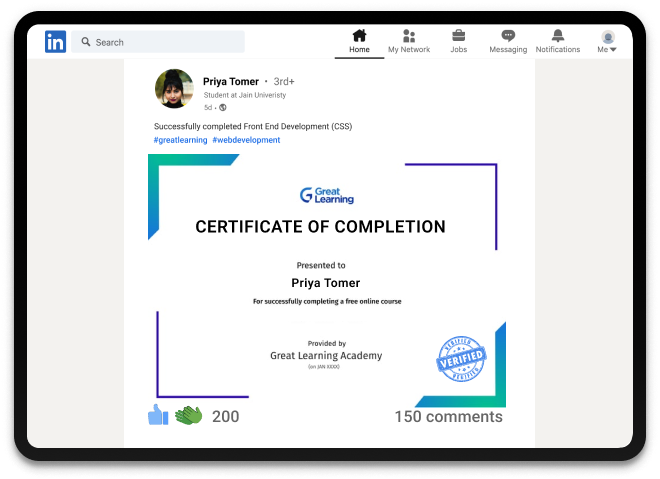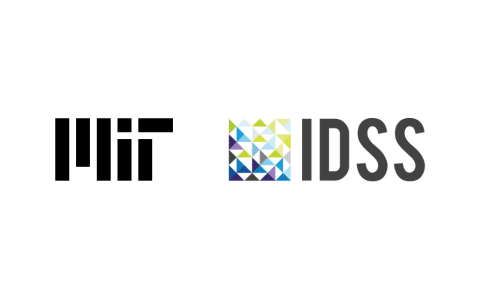Probability for Data Science
Enroll In Probability for Data Science Free Course & Get Free Certificate On Completion. Also Get Access To 1000+ Free Courses With Free Certificates Now. No Ads Or Payment. Just Sign Up For Free!
What you learn in Probability for Data Science ?
About this Free Certificate Course
The Probability for Data Science course begins with introducing you to different concepts in probability. It then continues with inculcating in you the skills to work with marginal probability to solve problems that are events irrespective of the outcome of another value and the Bayes Theorem that deals with the probability of occurrence of events based on the occurrence of other events. You can refer to the attached study materials at any point after enrolling in the course and take up the quiz at the end to test your knowledge and understand your gains.
After completing this free, self-paced, beginner's guide to Probability for Data Science, you can register for top-rated Data Science Courses and embark on your Data Science career with a professional Post Graduate certificate and learn various concepts with millions of aspirants across the globe!
Course Outline
This section includes answers to questions like what is probability? Why is there a need to learn probability? What are the rules of probability? You shall look at the application of probability later in this section.
You will learn about marginal probability and understand its features. The section also solves a problem when the condition is a margin to help you understand the concept better.
The section begins with explaining what Bayes theorem is and then continues with helping you understand the concept with addition and multiplication rules. You will then work with a problem statement and derive a solution to it to understand the concept better.
Our course instructor

Dr. P K Viswanathan
Professor, Analytics & Operations
Dr. P K Viswanathan, currently serves as a professor of analytics at Great Lakes Institute of Management. He teaches subjects such as business statistics, operations research, business analytics, predictive analytics, ML analytics, spreadsheet modeling and others. In the industrial tenure spanning over 15 years, he has held senior management positions in Ballarpur Industries (BILT) of the Thapar Group and the JK Industries of the JK Organisation. Apart from executing corporate consultancy assignments, Dr. PK Viswanathan has also designed and conducted training programs for many leading organizations in India. He has degrees in MSc (Madras), MBA (FMS, Delhi), MS (Manitoba, Canada), PHD (Madras).
Noteworthy achievements:
- Ranked 12th in the "20 Most Prominent Analytics & Data Science Academicians In India: 2018".
- Current Academic Position: Professor of Analytics, Great Lakes Institute of Management.
- Prominent Credentials: He has authored a total of four books, three of which are on Business Statistics and one on Marketing Research published by the British Open University Business School, UK.
- Research Interest: Analytics, ML, AI.
- Patents: He has original research publications exclusively on analytics where he has developed modeling and demonstrated their decision support capabilities. These are: Modelling Credit Default in Microfinance — An Indian Case Study, PK Viswanathan, SK Shanthi, Modelling Asset Allocation and Liability Composition for Indian Banks.
- Teaching Experience: He has been teaching analytics for more than two decades but has been into active and intense teaching since analytics started witnessing a meteoric growth with the advent of R and Python.
- Ph.D. in the application of Operations Research from Madras University.
With this course, you get
Free lifetime access
Learn anytime, anywhere
Completion Certificate
Stand out to your professional network
1.5 Hours
of self-paced video lectures
Frequently Asked Questions
What are the prerequisites required to learn this Probability for Data Science course?
Before you start learning Probability for Data Science, you will need to know probability and data science concepts. With those basics earned, you are good to go to learn probability for a Data Science course.
How long does it take to complete this free Probability for Data Science course?
Probability for Data Science is a 1.5 hours long course, but it is self-paced. So, once you enroll, you can take your own time to complete the course.
Will I have lifetime access to the free course?
Yes, once you enroll in the course, you will have lifetime access to any of Great Learning Academy’s free courses. You can login and learn whenever you want to.
What are my next learning options after this Probability for Data Science course?
Probability for Data Science is a small topic in the more extensive domain of Data Science. After you have learned it, your next goal has to be to cover everything that falls under the bigger umbrella. Enroll in a professional Data Science course to explore more.
Why learn Probability for Data Science?
Probability is one of the exciting parts of data science and makes it an inseparable part. Probability has to be the first front foot for anybody interested in learning data science since its theories make the backbone.
Success stories
Can Great Learning Academy courses help your career? Our learners tell us how.And thousands more such success stories..
Related Data Science Courses
Popular Upskilling Programs
Explore new and trending free online courses
Relevant Career Paths >
Other Data Science tutorials for you
Probability for Data Science
Probability is a mathematical concept that plays a key role in the field of data science. In data science, probability is used to model and make predictions about uncertain events based on past data. Probability is also used to quantify the likelihood of different outcomes, to make inferences and draw conclusions from data, and to evaluate the reliability of data-driven models.
Probability is a powerful tool for data scientists, as it allows them to model and make predictions about complex and uncertain phenomena. Some of the key use cases and benefits of probability in data science include:
Predictive modeling: Probability is used to build predictive models that can make predictions about future events based on past data. For example, a financial institution may use probability models to predict credit risk or market trends.
Statistical inference: Probability is used to make inferences and draw conclusions from data. For example, a data scientist may use probability models to infer the relationship between different variables, or to estimate the distribution of a population based on a sample of data.
Model evaluation: Probability is used to evaluate the reliability of data-driven models. For example, a data scientist may use probability models to assess the accuracy of a predictive model or to determine the confidence interval of a prediction.
Probability is important in data science because it provides a framework for modeling and predicting uncertain events. Understanding probability is essential for data scientists, as it allows them to make informed decisions based on data and to evaluate the reliability of data-driven models.
In conclusion, probability is a critical component of the field of data science. Whether you are a data scientist, a business analyst, or a student, understanding probability will help you to model and make predictions about complex and uncertain phenomena, to make informed decisions based on data, and to evaluate the reliability of data-driven models. The benefits of probability in data science, including predictive modeling, statistical inference, and model evaluation, make it an important tool for anyone interested in the field of data science.












































.jpg)







